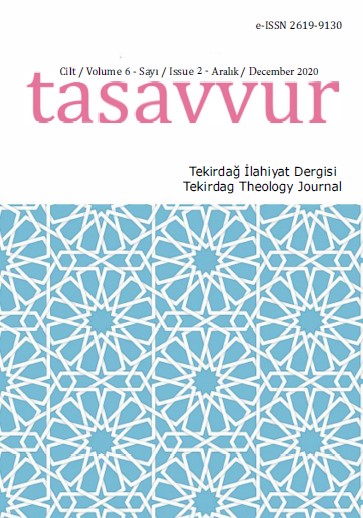İdil-Ural Âlimlerinden Rızâeddîn bin Fahreddîn’in (1859–1936) İbn Arabî Değerlendirmesi
An Assessment on Ibn al-‘Arabī by the Idel-Ural Scholar Rizaeddin bin Fakhreddin (1859-1936)
Author(s): Özkan ÖztürkSubject(s): Islam studies, Philosophy of Middle Ages, 19th Century Philosophy, Contemporary Philosophy, 13th to 14th Centuries
Published by: Tekirdağ Namık Kemal Üniversitesi İlahiyat Fakültesi
Keywords: Ibn al-‘Arabī; Rizaeddin bin Fakhreddin; wahdat al-wujūd;
Summary/Abstract: Rizaeddin bin Fakhreddin is one of the most important thinkers who took part in the Jadidist movement in the Idil-Ural region in the 19th-20th centuries. He wrote the biography of many Islamic thinkers in order to contribute to the awakening of Muslims of Russia. One of them is about Ibn al-Arabi. In his work, he examines the ideas of Ibn al-‘Arabī under practical, scientific and philosophical titles. In the title of practical opinions, he deals with the issues of ijtihād, ijmāʿ and qiyās. In the title of scientific views, he examines the inclusiveness of mercy, rijāl al-ghayb and the faith of Pharaoh. In philosophical views, he stands out the discussions about the ʿālam al-mithāl and wahdat alwujūd. Rizaeddin bin Fakhreddin reevaluates the historical quarrels about Ibn al-Arabî in his work. He talks about three attitudes and groups on this subject. The first group sees him as heretical while the second group sees him as a great walī. The third group accepts him as a great walī but also adds that reading his works is inconvenient. In addition, Rizaeddin bin Fakhreddin mentions the effects of Ibn al-‘Arabī among the Muslims of İdil-Ural in his work. At the end of his work, he makes an evaluation about the opinions he mentioned about Ibn al-‘Arabī. It is possible to monitor the effect of neo-Salafist and reformist views in this assessment, which points to the weaknesses and potentialities of Ibn al-‘Arabī’s thought.
Journal: Tasavvur Tekirdağ İlahiyat Dergisi
- Issue Year: 6/2020
- Issue No: 2
- Page Range: 657-700
- Page Count: 55
- Language: Turkish

